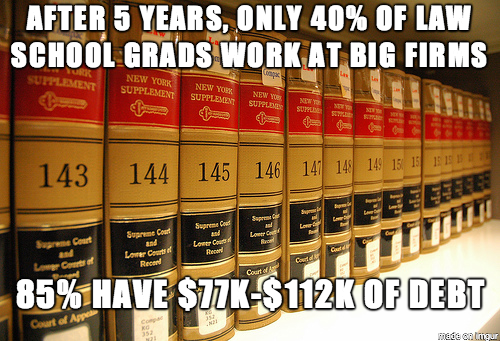Real odds of becoming a high-paid corporate lawyer
Joyce Park stashed this in Saving money
Stashed in: Young Americans, Awesome, Lawyers!, Factoids, Personal Finance, Real Talk, Student Loans, Nuggets
Thinking about going to law school? Think you can pay for it with your fatty future salary as a hotshot corporate lawyer? Here are your exact odds. Also, 20% of law school grads don't even have jobs that require JD degrees after 5 years.
Odds vary a LOT based on where you attend school. This is a little old now, but still very much on point: http://abovethelaw.com/2014/06/the-atl-markup-of-slates-apply-to-law-school-now-article/
Actually, that article seems to make the same point:
Among all graduates who reported their job status, only 57 percent found full-time, long-term work, meaning the job lasted at least a year and was either a clerkship or required bar passage — and only 55.3 percent did when you exclude jobs funded by law schools to game their n
Yes, those are the correct overall odds. But someone graduating from Stanford is facing entirely different odds than someone graduating from, say, Cooley. A quick perusal of attorney profiles at any BIGLAW firm (the ones that pay the higher end of the bimodal salary distribution http://www.nalp.org/salarydistrib ) to see the alma maters will give you a rough idea. Basically the odds decline rapidly with school rank (U.S. News lawschool rank, that is), particularly outside the top 20 or so (some would argue outside the top 14, but I think that's overly conservative).
I wonder why the profession itself doesn't clamp down on schools pumping out so many people with law degrees.
Example: We see the medical profession making sure there are a limited number of med students so that getting a medical degree means there's a good chance the graduating student will enter the profession.
I'm not sure. Both AMA and the Bar Associations work as guilds and try to restrain competition by restricting entry to the profession, but the AMA keeps more control of the medical schools (mostly by not accrediting more schools in the face of decades of excess demand), while the Bar focuses on using the bar exams, which are generally taken post-graduation, to keep numbers of new entrants to the field down.
Perhaps the Bar Associations believe that a degree from law school is valuable even if the person who has it does not pass a bar exam?
I generally think law school is a bad proposition if you're going into a large debt to do so, unless either 1) You get into a top-20 school that has a lot of alums working at BIGLAW in a geographic market you want to be in, or 2) you want to go work for the government or some other career path that can qualify for debt forgiveness at the school you attend (and you have a reasonably good likelihood of getting that job). And, people should be wary of scholarship offers from lower-ranked schools, many of which do some underhanded stuff (such as putting all the scholarship recipients into the same section so that some (or most) will be unable to maintain the required GPA to keep the scholarship just based on the curve of the section).
Well said.
I'm increasingly of the belief that no school is worth going into large debt for.











9:07 AM Dec 21 2015